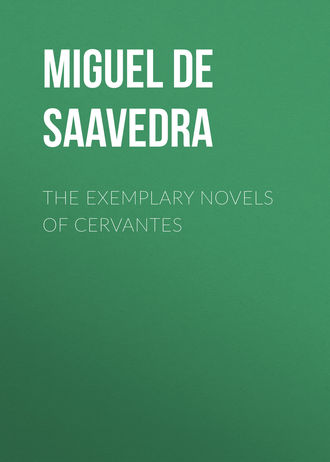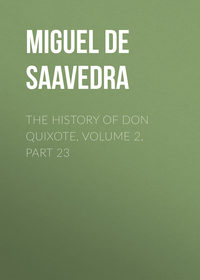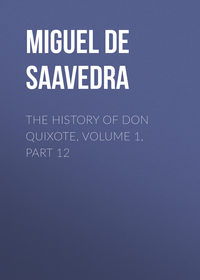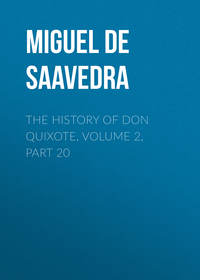 полная версия
полная версияThe Exemplary Novels of Cervantes
"God's mercy, Andrew, how thin-skinned you are! On how fine a thread you make your hopes and my reputation hang, since you let the cruel sword of jealousy so easily pierce your soul. Tell me, Andrew, if there were any artifice or deceit in this case, could I not have held my tongue about this youth, and concealed all knowledge of him? Am I such a fool that I cannot help telling you what should make you doubt my integrity and good behaviour? Hold your tongue, Andrew, in God's name, and try to-morrow to extract from this cause of your alarm whither he is bound, and why he is come hither. It may be that you are mistaken in your suspicion, though I am not mistaken in what I told you of the stranger. And now for your greater satisfaction – since it is come to that pass with me that I seek to satisfy you – whatever be the reason of this youth's coming, send him away at once. All our people obey you, and none of them will care to receive him into their huts against your wish. But if this fails, I give you my word not to quit mine, or let myself be seen by him, or by anybody else from whom you would have me concealed. Look you, Andrew, I am not vexed at seeing you jealous, but it would vex me much to see you indiscreet."
"Unless you see me mad, Preciosa," said Andrew, "any other demonstration would be far short of showing you what desperate havoc jealousy can make of a man's feelings. However, I will do as you bid me, and find out what this señor page-poet wants, whither he is going, and whom he is in search of. It may be, that unawares he may let me get hold of some end of thread which shall lead to the discovery of the whole snare which I fear he is come to set for me."
"Jealousy, I imagine," said Preciosa, "never leaves the understanding clear to apprehend things as they really are. Jealousy always looks through magnifying glasses, which make mountains of molehills, and realities of mere suspicions. On your life, Andrew, and on mine, I charge you to proceed in this matter, and all that touches our concerns, with prudence and discretion; and if you do, I know that you will have to concede the palm to me, as honest, upright, and true to the very utmost."
With these words she quitted Andrew, leaving him impatient for daylight, that he might receive the confession of the wounded man, and distracted in mind by a thousand various surmises. He could not believe but that this page had come thither attracted by Preciosa's beauty; for the thief believes that all men are such as himself. On the other hand, the pledge voluntarily made to him by Preciosa appeared so highly satisfactory, that he ought to set his mind quite at ease, and commit all his happiness implicitly to the keeping of her good faith. At last day appeared: he visited the wounded man; and after inquiring how he was, and did his bites pain him, he asked what was his name, whither he was going, and how it was he travelled so late and so far off the road. The youth replied that he was better, and felt no pain so that he was able to resume his journey. His name was Alonzo Hurtado; he was going to our Lady of the Peña de Francia, on a certain business; he travelled by night for the greater speed; and having missed his way, he had come upon the encampment, and been worried by the dogs that guarded it. Andrew did not by any means consider this a straightforward statement: his suspicions returned to plague him; and, said he, "Brother, if I were a judge, and you had been brought before me upon any charge which would render necessary such questions as those I have put to you, the reply you have given would oblige me to apply the thumb-screw. It is nothing to me who you are, what is your name, or whither you are going: I only warn you, that if it suits your convenience to lie on this journey, you should lie with more appearance of truth. You say you are going to La Peña de Francia, and you leave it on the right hand more than thirty leagues behind this place. You travel by night for sake of speed, and you quit the high road, and strike into thickets and woods where there is scarcely a footpath. Get up, friend, learn to lie better, and go your ways, in God's name. But in return for this good advice I give you, will you not tell me one truth? I know you will, you are such a bad hand at lying. Tell me, are you not one I have often seen in the capital, something between a page and a gentleman? One who has the reputation of being a great poet, and who wrote a romance and a sonnet upon a gitanilla who some time ago went about Madrid, and was celebrated for her surpassing beauty? Tell me, and I promise you, on the honour of a gentleman gipsy, to keep secret whatever you may wish to be so kept. Mind you, no denial that you are the person I say will go down with me; for the face I see before me is unquestionably the same I saw in Madrid. The fame of your talents made me often stop to gaze at you as a distinguished man, and therefore your features are so strongly impressed on my memory, though your dress is very different from that in which I formerly saw you. Don't be alarmed, cheer up, and don't suppose you have fallen in with a tribe of robbers, but with an asylum, where you may be guarded and defended from all the world. A thought strikes me; and if it be as I conjecture, you have been lucky in meeting me above all men. What I conjecture is, that being in love with Preciosa – that beautiful young gipsy, to whom you addressed the verses – you have come in search of her; for which I don't think a bit the worse of you, but quite the reverse: for gipsy though I am, experience has shown me how far the potent force of love reaches, and the transformations it makes those undergo whom it brings beneath its sway and jurisdiction. If this be so, as I verily believe it is, the fair gitanilla is here."
"Yes, she is here; I saw her last night," said the stranger. This was like a death-blow to Andrew; for it seemed at once to confirm all his suspicions.
"I saw her last night," the young man repeated; "but I did not venture to tell her who I was, for it did not suit my purpose."
"So, then," said Andrew, "you are indeed the poet of whom I spoke."
"I am: I neither can nor will deny it. Possibly it may be that where I thought myself lost I have come right to port, if, as you say, there is fidelity in the forests, and hospitality in the mountains."
"That there is, beyond doubt," said Andrew; "and among us gipsies the strictest secrecy in the world. On that assurance, señor, you may unburden your breast to me: you will find in mine no duplicity whatever. The gitanilla is my relation, and entirely under my control. If you desire her for a wife, myself and all other relations will be quite willing; and if for a mistress, we will not make any squeamish objections, provided you have money, for covetousness never departs from our ranchos."
"I have money," the youth replied; "in the bands of this frock, which I wear girt round my body, there are four hundred gold crowns."
This was another mortal blow for Andrew, who assumed that the stranger could carry so large a sum about him for no other purpose than to purchase possession of the beloved object. With a faltering tongue he replied, "That is a good lump of money; you have only to discover yourself, and go to work: the girl is no fool, and will see what a good thing it will be for her to be yours."
"O friend," exclaimed the youth, "I would have you know that the power which has made me change my garb is not that of love, as you say, nor any longing for Preciosa; for Madrid has beauties who know how to steal hearts and subdue souls as well as the handsomest gitanas, and better; though I confess that the beauty of your kinswoman surpasses any I have ever seen. The cause of my being in this dress, on foot, and bitten by dogs, is not love but my ill luck."
Upon this explanation, Andrew's downcast spirit began to rise again; for it was plain that the wind was in quite a different quarter from what he had supposed. Eager to escape from this confusion, he renewed his assurances of secrecy, and the stranger proceeded thus: —
"I was in Madrid, in the house of a nobleman, whom I served not as a master but as a relation. He had an only son and heir, who treated me with great familiarity and friendship, both on account of our relationship, and because we were both of the same age and disposition. This young gentleman fell in love with a young lady of rank, whom he would most gladly have made his wife, had it not been for his dutiful submission to the will of his parents, who desired him to marry into a higher family. Nevertheless, he continued furtively to pay court to the lady of his choice, carefully concealing his proceedings from all eyes but mine. One night, which ill luck must have especially selected for the adventure I am about to relate to you, as we were passing by the lady's house, we saw ranged against it two men of good figure apparently. My kinsman wished to reconnoitre them, but no sooner had he made a step towards them than their swords were out, their bucklers ready, and they made at us, whilst we did the same on our side, and engaged them with equal arms. The fight did not last long, neither did the lives of our two opponents; for two thrusts, urged home by my kinsman's jealousy and my zeal in his defence, laid them both low – an extraordinary occurrence, and such as is rarely witnessed. Thus involuntarily victorious, we returned home, and taking all the money we could, set off secretly to the church of San Geronimo, waiting to see what would happen when the event was discovered next day, and what might be the conjectures as to the persons of the homicides.
"We learned that no trace of our presence on the scene had been discovered, and the prudent monks advised us to return home, so as not by our absence to arouse any suspicion against us. We had already resolved to follow their advice, when we were informed that the alcaldes of the court had arrested the young lady and her parents; and that among their domestics, whom they examined, one person, the young lady's attendant, had stated that my kinsman visited her mistress by night and by day. Upon this evidence they had sent in search of us; and the officers not finding us, but many indications of our flight, it became a confirmed opinion throughout the whole city, that we were the very men who had slain the two cavaliers, for such they were, and of very good quality. Finally, by the advice of the count, my relation, and of the monks, after remaining hid a fortnight in the monastery, my comrade departed in company with a monk, himself disguised as one, and took the road to Aragon, intending to pass over to Italy, and thence to Flanders, until he should see what might be the upshot of the matter. For my part, thinking it well to divide our fortunes, I set out on foot, in a different direction, and in the habit of a lay brother, along with a monk, who quitted me at Talavera. From that city I travelled alone, and missed my way, till last night I reached this wood, when I met with the mishap you know. If I asked for La Peña de Francia, it was only by way of making some answer to the questions put to me; for I know that it lies beyond Salamanca."
"True," observed Andrew, "you left it on your right, about twenty leagues from this. So you see what a straight road you were taking, if you were going thither."
"The road I did intend to take was that to Seville; for there I should find a Genoese gentleman, a great friend of the count my relation, who is in the habit of exporting large quantities of silver ingots to Genoa; and my design is, that he should send me with his carriers, as one of themselves, by which means I may safely reach Carthagena, and thence pass over to Italy; for two galleys are expected shortly to ship some silver. This is my story, good friend: was I not right in saying it is the result of pure ill luck, rather than disappointed love? Now if these señores gitanos will take me in their company to Seville, supposing they are bound thither, I will pay them handsomely; for I believe that I should travel more safely with them, and have some respite from the fear that haunts me."
"Yes, they will take you," said Andrew; "or if you cannot go with our band – for as yet I know not that we are for Andalusia – you can go with another which we shall fall in with in a couple of days; and if you give them some of the money you have about you, they will be able and willing to help you out of still worse difficulties." He then left the young man, and reported to the other gipsies what the stranger desired, and the offer he had made of good payment for their services.
They were all for having their guest remain in the camp; but Preciosa was against it; and her grandmother said, that she could not go to Seville or its neighbourhood, on account of a hoax she had once played off upon a capmaker named Truxillo, well known in Seville. She had persuaded him to put himself up to his neck in a butt of water, stark naked, with a crown of cypress on his head, there to remain till midnight, when he was to step out, and look for a great treasure, which she had made him believe was concealed in a certain part of his house. When the good cap-maker heard matins ring, he made such haste to get out of the butt, lest he should lose his chance, that it fell with him, bruising his flesh, and deluging the floor with water, in which he fell to swimming with might and main, roaring out that he was drowning. His wife and his neighbours ran to him with lights, and found him striking out lustily with his legs and arms. "Help! help!" he cried; "I am suffocating;" and he really was not far from it, such was the effect of his excessive fright. They seized and rescued him from his deadly peril. When he had recovered a little, he told them the trick the gipsy woman had played him; and yet for all that, he dug a hole, more than a fathom deep, in the place pointed out to him, in spite of all his neighbours could say; and had he not been forcibly prevented by one of them, when he was beginning to undermine the foundations of the house, he would have brought the whole of it down about his ears. The story spread all over the city; so that the little boys in the streets used to point their fingers at him, and shout in his ears the story of the gipsy's trick, and his own credulity. Such was the tale told by the old gitana, in explanation of her unwillingness to go to Seville.
The gipsies, knowing from Andrew that the youth had a sum of money about him, readily assented to his accompanying them, and promised to guard and conceal him as long as he pleased. They determined to make a bend to the left, and enter La Mancha and the kingdom of Murcia. The youth thanked them cordially, and gave them on the spot a hundred gold crowns to divide amongst them, whereupon they became as pliant as washed leather. Preciosa, however, was not pleased with the continuance among them of Don Sancho, for that was the youth's name, but the gipsies changed it to Clement. Andrew too was rather annoyed at this arrangement; for it seemed to him that Clement had given up his original intention upon very slight grounds; but the latter, as if he read his thoughts, told him that he was glad to go to Murcia, because it was near Carthagena, whence, if galleys arrived there, as he expected, he could easily pass over to Italy. Finally, in order to have him more under his own eye, to watch his acts, and scrutinise his thoughts, Andrew desired to have Clement for his own comrade, and the latter accepted this friendly offer as a signal favour. They were always together, both spent largely, their crowns came down like rain; they ran, leaped, danced, and pitched the bar better than any of their companions, and were more than commonly liked by the women of the tribe, and held in the highest respect by the men.
Leaving Estramadura they entered La Mancha, and gradually traversed the kingdom of Murcia. In all the villages and towns they passed through, they had matches at ball-playing, fencing, running, leaping, and pitching the bar; and in all these trials of strength, skill, and agility Andrew and Clement were victorious, as Andrew alone had been before. During the whole journey, which occupied six weeks, Clement neither found nor sought an opportunity to speak alone with Preciosa, until one day when she and Andrew were conversing together, they called him to them, and Preciosa said, "The first time you came to our camp I recognised you, Clement, and remembered the verses you gave me in Madrid; but I would not say a word, not knowing with what intention you had come among us. When I became acquainted with your misfortune, it grieved me to the soul, though at the same time it was a relief to me; for I had been much disturbed, thinking that as there was a Don Juan in the world who had become a gipsy, a Don Sancho might undergo transformation in like manner. I speak this to you, because Andrew tells me he has made known to you who he is, and with what intention he turned gipsy." (And so it was, for Andrew had acquainted Clement with his whole story, that he might be able to converse with him on the subject nearest to his thoughts.) "Do not think that my knowing you was of little advantage to you, since for my sake, and in consequence of what I said of you, our people the more readily admitted you amongst them, where I trust in God you may find things turn out according to your best wishes. You will repay me, I hope, for this good will on my part, by not making Andrew ashamed of having set his mind so low, or representing to him how ill he does in persevering in his present way of life; for though I imagine that his will is enthralled to mine, still it would grieve me to see him show signs, however slight, of repenting what he has done."
"Do not suppose, peerless Preciosa," replied Clement, "that Don Juan acted lightly in revealing himself to me. I found him out beforehand: his eyes first disclosed to me the nature of his feelings; I first told him who I was, and detected that enthralment of his will which you speak of; and he, reposing a just confidence in me, made his secret mine. He can witness whether I applauded his determination and his choice; for I am not so dull of understanding, Preciosa, as not to know how omnipotent is beauty; and yours, which surpasses all bounds of loveliness, is a sufficient excuse for all errors, if error that can be called for which there is so irresistible a cause. I am grateful to you, señora, for what you have said in my favour; and I hope to repay you by hearty good wishes that you may find a happy issue out of your perplexities, and that you may enjoy the love of your Andrew, and Andrew that of his Preciosa, with the consent of his parents; so that from so beautiful a couple there may come into the world the finest progeny which nature can form in her happiest mood. This is what I shall always desire, Preciosa; and this is what I shall always say to your Andrew, and not anything which could tend to turn him from his well-placed affections."
With such emotion did Clement utter these words, that Andrew was in doubt whether they were spoken in courtesy only, or from love; for the infernal plague of jealousy is so susceptible that it will take offence at the motes in the sunbeams; and the lover finds matter for self-torment in everything that concerns the beloved object. Nevertheless, he did not give way to confirmed jealousy; for he relied more on the good faith of his Preciosa than on his own fortune, which, in common with all lovers, he regarded as luckless, so long as he had not obtained the object of his desires. In fine, Andrew and Clement continued to be comrades and friends, their mutual good understanding being secured by Clement's upright intentions, and by the modesty and prudence of Preciosa, who never gave Andrew an excuse for jealousy. Clement was somewhat of a poet, Andrew played the guitar a little, and both were fond of music. One night, when the camp was pitched in a valley four leagues from Murcia, Andrew seated himself at the foot of a cork-tree, and Clement near him under an evergreen oak. Each of them had a guitar; and invited by the stillness of the night, they sang alternately, Andrew beginning the descant, and Clement responding.
ANDREWTen thousand golden lamps are lit on high,Making this chilly nightRival the noon-day's light;Look, Clement, on yon star-bespangled sky,And in that image see,If so divine thy fancy be,That lovely radiant face,Where centres all of beauty and of grace.CLEMENTWhere centres all of beauty and of grace,And where in concord sweetGoodness and beauty meet,And purity hath fixed its dwelling-place.Creature so heavenly fair,May any mortal genius dare,Or less than tongue divine,To praise in lofty, rare, and sounding line?ANDREWTo praise in lofty, rare, and sounding lineThy name, gitana bright!Earth's wonder and delight,Worthy above the empyrean vault to shine;Fain would I snatch from FameThe trump and voice, whose loud acclaimShould startle every ear,And lift Preciosa's name to the eighth sphere.CLEMENTTo lift Preciosa's fame to the eighth sphereWere meet and fit, that soThe heavens new joy might knowThrough all their shining courts that name to hear,Which on this earth doth soundLike music spreading gladness round,Breathing with charm intensePeace to the soul and rapture to the sense.It seemed as though the freeman and the captive were in no haste to bring their tuneful contest to conclusion, had not the voice of Preciosa, who had overheard them, sounded from behind in response to theirs. They stopped instantly, and remained listening to her in breathless attention. Whether her words were delivered impromptu, or had been composed some time before, I know not; however that may be, she sang the following lines with infinite grace, as though they were made for the occasion.
While in this amorous empriseAn equal conflict I maintain,'Tis higher glory to remainPure maid, than boast the brightest eyes.The humblest plant on which we tread,If sound and straight it grows apace,By aid of nature or of graceMay rear aloft towards heaven its head.In this my lowly poor estate,By maiden honour dignified,No good wish rests unsatisfied;Their wealth I envy not the great.I find not any grief or painIn lack of love or of esteem;For I myself can shape, I deem,My fortunes happy in the main.Let me but do what in me liesThe path of rectitude to tread;And then be welcomed on this headWhatever fate may please the skies.I fain would know if beauty hathSuch high prerogative, to raiseMy mind above the common ways,And set me on a loftier path.If equal in their souls they be,The humblest hind on earth may vieIn honest worth and virtue highWith one of loftiest degree.What inwardly I feel of mineDoth raise me all that's base above;For majesty, be sure, and loveDo not on common soil recline.Preciosa having ended her song, Andrew and Clement rose to meet her. An animated conversation ensued between the three; and Preciosa displayed so much intelligence, modesty, and acuteness, as fully excused, in Clement's opinion, the extraordinary determination of Andrew, which he had before attributed more to his youth than his judgment. The next morning the camp was broken up, and they proceeded to a place in the jurisdiction of Murcia, three leagues from the city, where a mischance befel Andrew, which went near to cost him his life.
After they had given security in that place, according to custom, by the deposit of some silver vessels and ornaments, Preciosa and her grandmother, Christina and two other gitanillas, Clement, and Andrew, took up their quarters in an inn, kept by a rich widow, who had a daughter aged about seventeen or eighteen, rather more forward than handsome. Her name was Juana Carducha. This girl having seen the gipsies dance, the devil possessed her to fall in love with Andrew to that degree that she proposed to tell him of it, and take him for a husband, if he would have her, in spite of all her relations. Watching for an opportunity to speak to him, she found it in a cattle-yard, which Andrew had entered in search of two young asses, when she said to him, hurriedly, "Andrew" (she already knew his name), "I am single and wealthy. My mother has no other child: this inn is her own; and besides it she has large vineyards, and several other houses. You have taken my fancy; and if you will have me for a wife, only say the word. Answer me quickly, and if you are a man of sense, only wait, and you shall see what a life we shall lead."
Astonished as he was at Carducha's boldness, Andrew nevertheless answered her with the promptitude she desired, "Señora doncella, I am under promise to marry, and we gitanos intermarry only with gitanas. Many thanks for the favour you would confer on me, of which I am not worthy."









